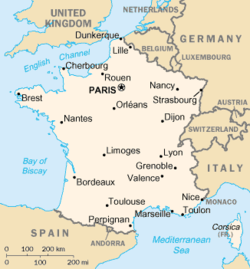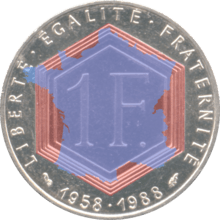Metropolitan France

Metropolitan France (French: France métropolitaine or la Métropole) is the part of France in Europe. It comprises mainland France and nearby islands in the Atlantic Ocean, the English Channel (French: la Manche), and the Mediterranean Sea, including Corsica. Overseas France (la France d'outre-mer) is the collective name for the part of France outside Europe: French overseas regions (départements et régions d'outre-mer or DROM),[1] territories (territoires d'outre-mer or TOM), collectivities (collectivités d'outre-mer or COM), and the sui generis collectivity (collectivité sui generis) of New Caledonia.
Metropolitan France and Overseas France together form the French Republic. Metropolitan France accounts for 82.2% of the land territory, 3.3% of the exclusive economic zone (EEZ), and 95.9% of the population of the French Republic.
The five overseas regions—Martinique, Guadeloupe, Réunion, French Guiana, and Mayotte—have the same political status as metropolitan France's regions. Metropolitan France and these five overseas regions together are sometimes called la France entière ("the whole of France") by the French administration, although in reality this France entière does not include the French overseas collectivities and territories which have more autonomy than the overseas departments.
In overseas France, a person from metropolitan France is often called a métro, short for métropolitain.
Etymology
The term "metropolitan France" dates from the country's colonial period (from the 16th through the 20th centuries), when France was referred to as la Métropole (literally "the Metropolis") as distinguished from its colonies and protectorates, known as les colonies or l'Empire. Similar terms existed to describe other European colonial powers (e.g. "metropolitan Britain", "España metropolitana"). This usage of the words "metropolis" and "metropolitan" itself came from Ancient Greek "metropolis" (from μήτηρ mētēr "mother" and πόλις pólis "city, town") which was the name for a city-state from which originated colonies across the Mediterranean (e.g. Marseille was a colony of the city-state of Phocaea, therefore Phocaea was the "metropolis" of Marseille). By extension "metropolis" and "metropolitan" came to mean "motherland", a nation or country as opposed to its colonies overseas.
Today there are some people in overseas France who object to the use of the term la France métropolitaine due to its colonial origins. They prefer to call it "the European territory of France" (le territoire européen de la France), as the Treaties of the European Union do. Likewise, they oppose treating overseas France and metropolitan France as separate entities. For example, INSEE used to calculate its statistics (demography, economy, etc.) for metropolitan France only, and then treat the overseas departments and territories separately, but people in the overseas departments opposed this separate treatment, arguing that the five overseas departments are fully part of France. As a result, since the end of the 1990s INSEE has included the five overseas departments in its figures for France (such as total population or GDP). INSEE refers to metropolitan France and the five overseas departments as la France entière ("the whole of France"); "the whole of France" includes the five overseas departments, but does not include the other overseas collectivities and territories. Other branches of the French administration may have different definitions of what la France entière is. For example, when the Ministry of the Interior releases election results, they use the name la France entière to refer to the entire French Republic, including all of overseas France and not just the five overseas departments contrary to INSEE.
Note that since INSEE now calculates statistics for la France entière, this practice has spread to international institutions so that, for instance, the French GDP published by the World Bank includes metropolitan France and the five overseas departments. The World Bank refers to this as "France" only, and not "the whole of France" as INSEE does.
Statistics
According to the French government, 64,513,242 people lived in metropolitan France as of January 2016.[2] In July 2015, however, the Central Intelligence Agency estimated the total population of metropolitan France to be significantly smaller, issuing a figure of 62,814,233 inhabitants.[3]
Metropolitan France covers a land area of 551,695 km² (213,011 sq. miles). At sea, the exclusive economic zone (EEZ) of metropolitan France covers 334,604 km² (129,191 sq. miles), while the EEZ of overseas France covers 9,821,231 km² (3,791,998 sq. miles), for a total of 10,155,835 km² (3,921,190 sq. miles) in the French Republic (excluding Adélie Land).[4]
In the second round of the 2007 French presidential election, 37,342,004 French people cast a ballot (meaning a record turnout of 83.97%). 35,907,015 of these (96.16% of the total voters) cast their ballots in metropolitan France (turnout: 85.31%), 1,088,679 (2.91% of the total voters) cast their ballots in overseas France (turnout: 69.85%), and 346,310 (0.93% of the total voters) cast their ballots in foreign countries (French people living abroad; turnout: 42.13%).[5]
The French National Assembly is made up of 577 deputies, 539 of whom (93.4% of the total) are elected in metropolitan France, 27 (4.7% of the total) in overseas France, and 11 (1.9% of the total) by French citizens living in foreign countries.
Mainland France

Mainland France (French: la France continentale), or just "the mainland" (French: le continent), does not include the French islands in the Atlantic Ocean, English Channel or Mediterranean Sea, the largest of which is Corsica.
In Corsica, people from the mainland part of Metropolitan France are referred to as les continentaux.
A casual synonym for the mainland part of Metropolitan France is l'Hexagone ("the Hexagon"), for its approximate shape, and the adjective hexagonal may be a casual synonym of French (usually understood as metropolitan only, except in topics related to the foreign affairs and national politics of France as a whole).
See also
References
- ↑ Since 2003, the constitutional term for an overseas department is overseas region (French: région d'outre-mer).
- ↑ "Population totale par sexe et âge au 1er janvier 2016, France métropolitaine". Insee.fr. Institut national de la statistique et des études économiques. Retrieved 27 January 2016.
- ↑ "France". The World Factbook. Central Intelligence Agency. Retrieved 4 February 2016.
- ↑ The Pew Charitable Trusts. "SEA AROUND US PROJECT: Exclusive Economic Zones (EEZ)". Archived from the original on January 2, 2014. Retrieved 2014-01-31.
- ↑ Minister of the Interior, Government of France. "RESULTATS DE L'ELECTION PRESIDENTIELLE" (in French). Retrieved 2007-06-02.
Coordinates: 46°00′N 2°00′E / 46.000°N 2.000°E